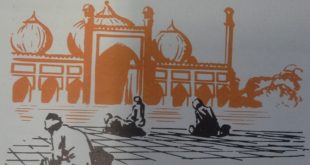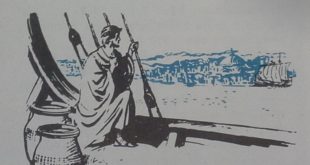Thirteen and a half centuries ago a new religion began in Arabia. Today millions of people are followers of this religion. It is called Islam and its followers, Moslems. All their lives long, Moslems must pray, in ways clearly prescribed, five times every day. No ordinary event must be allowed to interfere with these moments of prayer. Moslems must learn to recite their creed — a long statement of their religious belief. For one month each year they must fast all of every day from sunrise to sunset. They must give generously to charity. They should, if at all possible, go at least once during their lives to the holy city of Mecca, where Mohammed, the founder of Islam, began this new religion. People of other faiths are forbidden to enter Mecca. A few miles outside of Mecca, Moslems must change to pilgrims’ dress and proceed barefoot when they enter this city, high up in west-central Arabia. Mohammed and his first followers were Arabs. Arab merchants and Arab warriors, influenced the history of other peoples. United by loyalty to their religious faith, Arabs created a large empire. Arab rulers occupied positions of great influence and were keenly interested in advancing learning. How did all this come about? 1. How did the religion of Mohammed create a powerful Moslem world? 2. What kind of civilization developed in the Moslem world? 1. How did the Religion of Mohammed Create a Powerful Moslem World? Arab civilization started later than other great civilizations. The story of the Moslem world began about 600 A.D. in Arabia, a huge peninsula covered for the most part with burning desert. Arabia is separated from Africa by the Red Sea and from Iran (Persia) by the Persian Gulf. To the north and west of the Arabian peninsula is the …
Read More »Christianity Spread in a Divided Empire
Christianity was the movement that spread Across the Roman Empire Pointing the way for the rest of the ancient world toward belief in a single God. The year is 400 A.D. Andropolos paces impatiently up and down the deck of the merchant ship. He is eager to get back home; and to Andropolos, home is the city of Constantinople, a new capital of the Roman Empire. He can already see the walls and buildings of the great city shimmering in the distance. Now the ship is nearing the narrow Bosporus, the waterway where Europe and Asia are hardly a mile apart. The voyage from Ostia, the port of the old city of Rome, had been long and tiresome. Andropolos had been only too glad to leave Italy. The city that was once a hub of the Roman Empire, though still large, had a down at the heel look. Simultaneously the cities of northern Italy were becoming crowded with rough barbarians. Tall Germans also were filling the ranks of Roman legions. In times past, men such as these had been defeated again and again by Roman armies made up of men from Italy, but those victories had been won long ago and Rome had no such fighters left. Yes, Andropolos is thankful to leave Italy. Here in Constantinople the authority of the Roman emperor still counts. Andropolos shakes his head sadly as he recalls what has happened — the Roman Empire is not what it used to be. For Andropolos, though he is Greek born and Greek speaking, proudly calls himself a Roman citizen. The walls of Constantinople on the left grow closer as the ship enters the Bosporus. Soon it will dock in the harbour of the Golden Horn and Andropolos’ long voyage will be over. When he steps ashore, …
Read More »

